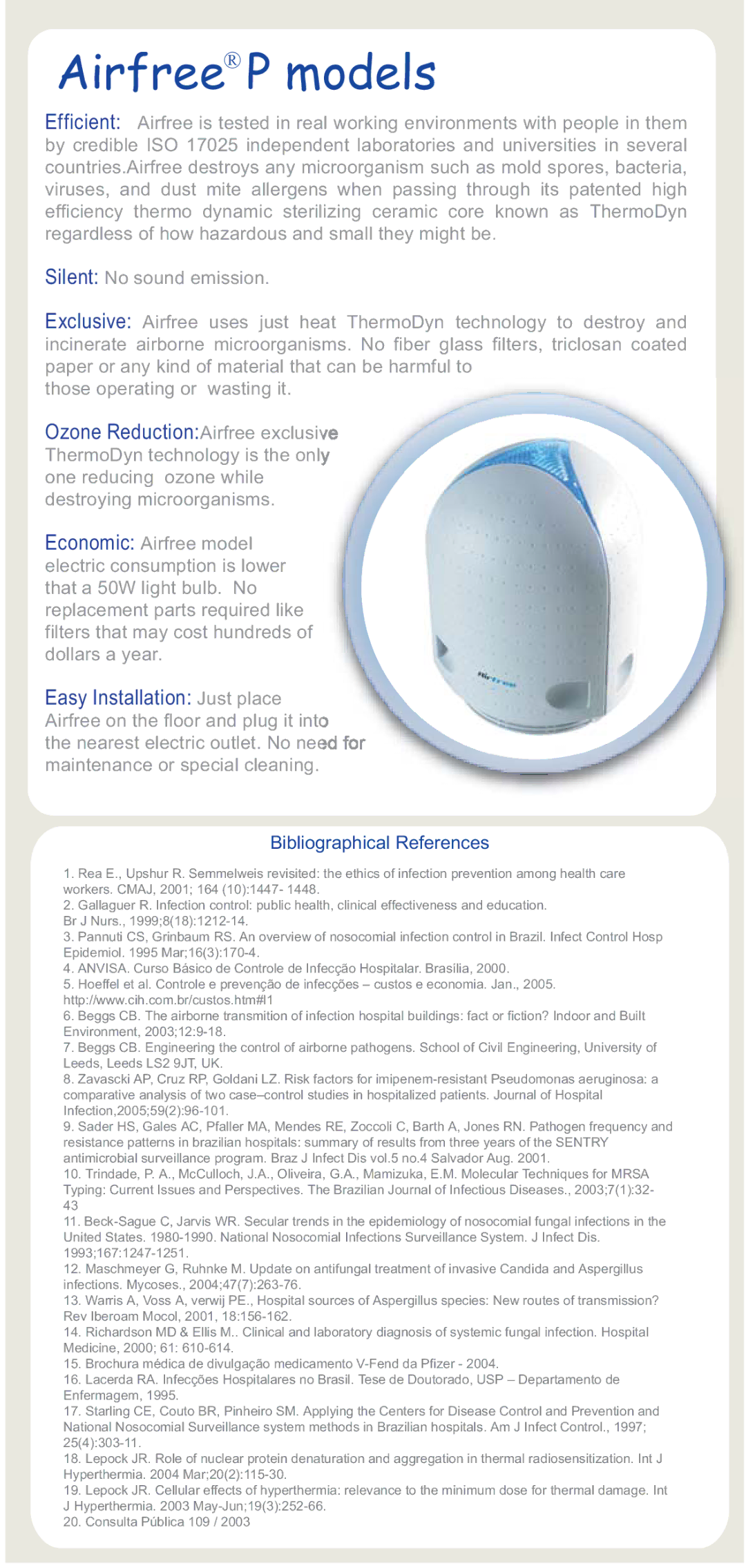
Airfree® P models
Efficient: Airfree is tested in real working environments with people in them by credible ISO 17025 independent laboratories and universities in several countries.Airfree destroys any microorganism such as mold spores, bacteria, viruses, and dust mite allergens when passing through its patented high efficiency thermo dynamic sterilizing ceramic core known as ThermoDyn regardless of how hazardous and small they might be.
Silent: No sound emission.
Exclusive: Airfree uses just heat ThermoDyn technology to destroy and incinerate airborne microorganisms. No fiber glass filters, triclosan coated paper or any kind of material that can be harmful to
those operating or wasting it.
Ozone Reduction:Airfree exclusive ThermoDyn technology is the only one reducing ozone while destroying microorganisms.
Economic: Airfree model electric consumption is lower that a 50W light bulb. No replacement parts required like filters that may cost hundreds of dollars a year.
Easy Installation: Just place Airfree on the floor and plug it into the nearest electric outlet. No need for maintenance or special cleaning.
Bibliographical References
1.Rea E., Upshur R. Semmelweis revisited: the ethics of infection prevention among health care workers. CMAJ, 2001; 164 (10):1447- 1448.
2.Gallaguer R. Infection control: public health, clinical effectiveness and education.
Br J Nurs.,
3.Pannuti CS, Grinbaum RS. An overview of nosocomial infection control in Brazil. Infect Control Hosp Epidemiol. 1995
4.ANVISA. Curso Básico de Controle de Infecção Hospitalar. Brasília, 2000.
5.Hoeffel et al. Controle e prevenção de infecções – custos e economia. Jan., 2005. http://www.cih.com.br/custos.htm#l1
6.Beggs CB. The airborne transmition of infection hospital buildings: fact or fiction? Indoor and Built Environment,
7.Beggs CB. Engineering the control of airborne pathogens. School of Civil Engineering, University of Leeds, Leeds LS2 9JT, UK.
8.Zavascki AP, Cruz RP, Goldani LZ. Risk factors for
9.Sader HS, Gales AC, Pfaller MA, Mendes RE, Zoccoli C, Barth A, Jones RN. Pathogen frequency and resistance patterns in brazilian hospitals: summary of results from three years of the SENTRY antimicrobial surveillance program. Braz J Infect Dis vol.5 no.4 Salvador Aug. 2001.
10.Trindade, P. A., McCulloch, J.A., Oliveira, G.A., Mamizuka, E.M. Molecular Techniques for MRSA Typing: Current Issues and Perspectives. The Brazilian Journal of Infectious Diseases., 2003;7(1):32-
11.
12.Maschmeyer G, Ruhnke M. Update on antifungal treatment of invasive Candida and Aspergillus infections. Mycoses.,
13.Warris A, Voss A, verwij PE., Hospital sources of Aspergillus species: New routes of transmission? Rev Iberoam Mocol, 2001,
14.Richardson MD & Ellis M.. Clinical and laboratory diagnosis of systemic fungal infection. Hospital Medicine, 2000; 61:
15.Brochura médica de divulgação medicamento
16.Lacerda RA. Infecções Hospitalares no Brasil. Tese de Doutorado, USP – Departamento de Enfermagem, 1995.
17.Starling CE, Couto BR, Pinheiro SM. Applying the Centers for Disease Control and Prevention and National Nosocomial Surveillance system methods in Brazilian hospitals. Am J Infect Control., 1997;
18.Lepock JR. Role of nuclear protein denaturation and aggregation in thermal radiosensitization. Int J Hyperthermia. 2004
19.Lepock JR. Cellular effects of hyperthermia: relevance to the minimum dose for thermal damage. Int J Hyperthermia. 2003
20.Consulta Pública 109 / 2003
